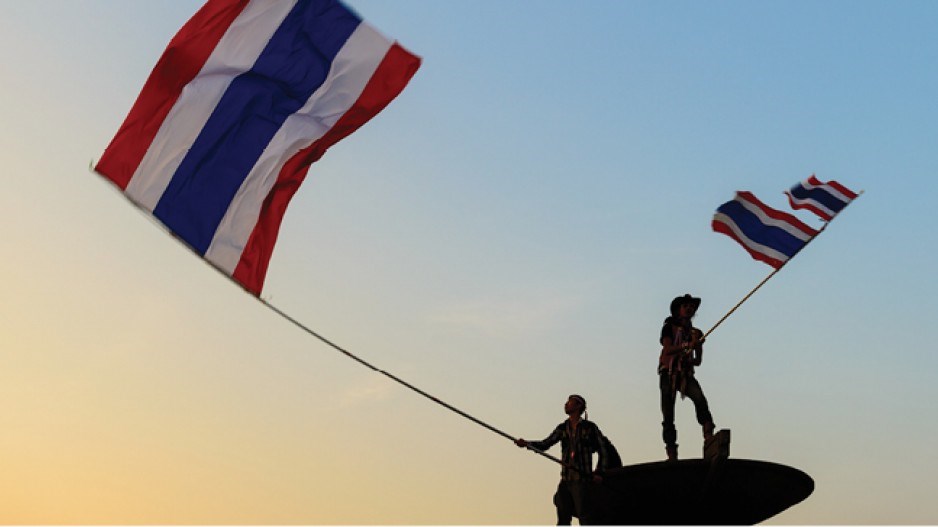Thailand's business and investment community is expressing cautious optimism that military rule will produce stable economic management, something absent from the dysfunctional democratic governments of the last seven years.
But the watchword is “cautious.” The mood among both local and foreign business people in Bangkok is that Thailand has a rocky and uncertain path ahead of it. The eventual production of a representative, accountable and effective government remains far from certain.
There is some cheer, though, in the perception that the head of the army, Gen. Prayuth Chan-ocha, who seized power on May 23 and has set up the National Council for Peace and Order junta, appears to be taking his stolen duties more seriously than did the generals in the last coup in 2006.
Then, the generals ousted prime minister Thaksin Shinawatra at the behest of senior officials in the palace of King Bhumibol Adulyadej and royalist street protesters, who see the vastly wealthy Shinawatra family as corrupt and power-hungry. But the generals quickly relinquished power without attempting to resolve the brutal divides in Thai politics. Parties loyal to and financed by self-exiled Thaksin have won every election since. The 2011 victory by Thaksin's sister Yingluck Shinawatra prompted this latest coup.
Gen. Prayuth has indicated he intends to stay in power for at least 15 months and probably longer. The immediate hope is that the junta will be able to produce a budget for its administration, something Yingluck has been unable to do. Air Chief Marshal Prajin Juntong, who has been given the junta's economic portfolio, has raised hopes by swiftly calling in business leaders for recommendations on priorities.
Beyond a budget, the possibility of a relief package for small and medium-sized businesses, and subsidy payments to buy off farmers in the heartland of Shinawatra family support in the north and northeast, the prospects get hazy.
Much depends on how aggressive Gen. Prayuth intends to be in restructuring Thailand's political system. The aim will be to create some kind of dispensation that makes it impossible for the Shinawatra family to regain elected power. At the very least, it is hard to see how this can be achieved without diminishing the authority of parliament and reviving the traditional role of Thai elites, with all the prospects of even more deeply entrenched corruption and inefficiency that that implies.
And a remaking of the constitution along these lines is only likely to sharpen the gaping political and economic divides that have fostered this crisis. There is even talk of civil war.
At the moment, even the most optimistic predictions are that the declines in private investment, tourism revenue and consumer confidence will continue. Economic growth is expected to be around 2% this year. Foreign investors took $500 million out of Thailand last month, though this flight could slow if the military manages to prevent violence.
There are also serious regional and international implications flowing from Gen. Prayuth's coup. There has been widespread international condemnation of the coup. The United States is phasing out all economic aid to Thailand, and Australia is banning bilateral dealings with the junta by all its senior officials. Sanctions from other countries may follow.
The coup has profound implications for the 10-nation regional club, the Association of Southeast Asian Nations (ASEAN). Twenty years ago ASEAN functioned with military or quasi-military regimes as members. Not any more. Next year ASEAN is due to evolve into an integrated economic organization similar to the European Union. There have always been doubts that this deadline could be met, and the coup in Thailand makes it even less likely. •
There was a telling moment on May 26 when Thailand's army chief, Gen. Prayuth Chan-ocha, received approval from the palace for the coup he had mounted three days before.
Gen. Prayuth did not kneel before King Bhumibol Adulyadej as he accepted royal appointment to head the ruling junta, but in front of a portrait of the monarch. This little piece of theatre suggests the king, who is 86 and has been under intense medical supervision since 2009, is no longer capable of making public appearances.
This is of profound significance. The essence of Thailand's political and economic crisis since 2006 has been an often-bloody contest between royalist elites and their opponents favouring the supremacy of parliament, who, for reasons either of patronage or ideology, cluster around the populist political machine of ousted prime minister Thaksin Shinawatra.
The rush has been for the factions to try to achieve control over the constitution before the king dies. The timing of Gen. Prayuth's coup suggests King Bhumibol's expected departure is closer than publicly admitted. Prayuth has made it clear he intends to remain in power for a prolonged period, clearly with the aim of trying to bring stability to what promises to be a very messy period of royal succession.
Even with full military power, this will not be simple.
The problem is that the heir, Crown Prince Maha Vajiralongkorn, a vindictive, arrogant and fickle man, is widely despised, even by royalists. An added complication is that the prince is reported to have become close to exiled Thaksin.
Thus Vajiralongkorn's succession could spur Thaksin's return to power.
For many years there has been talk of the succession going to the king's highly popular daughter, Princess Maha Chakri Sirindhorn. Engineering this move may well rise to the top of Prayuth's agenda.




